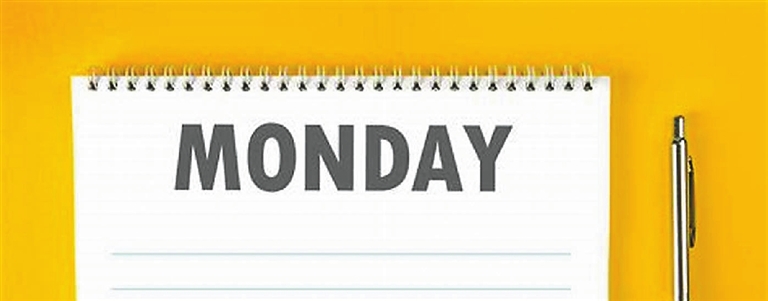
WITH the end of the year approaching, it’s not uncommon to start thinking about health goals for the new year, like losing weight, eating healthier, exercising and quitting smoking. But though we may have good intentions, choosing Jan. 1 to make promises to get on a healthier track year-round doesn’t always work. In fact, according to a 2017 Marist poll, about a third of people who make a New Year’s resolution fail to stick with it. This doesn’t mean we should give up on setting health goals for the new year. But it does mean we might need to rethink our goal-setting strategies. According to some experts, rather than setting a year-long goal at the start of the year, a more effective approach is to make “Monday resolutions”: weekly goals that can be thought of as mini-resolutions, taking advantage of the natural momentum of our weekly cycles, giving us a chance to start fresh each week. “If I mess up my diet on Tuesday or Wednesday, I know I can get back on track the following Monday,” said Lindsay Schwartz, a busy mom of two based in New York, who aims to eat healthfully and stay fit but finds herself eating one too many of her kids’ Charleston Chews left over from a birthday party or her own favorite indulgence, a handful of Lindt chocolates. There’s no sense starting again Thursday or Friday, or even Saturday, and Sunday is basically a “free-for-all,” according to Schwartz. “Monday is the only day that will work.” Unlike other days of the week, Mondays offer the opportunity for a health reset, when you might set intentions, celebrate progress or simply get back on your plan. “Monday can be thought of as the New Year’s of the week — a time to refresh and put our past bad deeds behind us and try and do better in the coming week,” said Joanna Cohen, director of the Johns Hopkins Bloomberg School of Public Health Institute for Global Tobacco Control. Peggy Neu, president of The Monday Campaigns initiative, agrees that “it makes achieving our health goals more sustainable. New Year’s only comes around once per year, but Mondays come every seven days. You basically get 52 chances a year to stay on track.” Focusing on a new goal or health initiative each week that will build on the previous is also an excellent way to ease someone into a new healthier lifestyle, said Marjorie Cohn, a registered dietitian and spokeswoman for the Academy of Nutrition and Dietetics. “Monday resolutions can help create more tangible positive outcomes for people to recognize.” Reflecting on small successes can be empowering. “Setting mini-goals creates a feeling of accomplishment, and when someone feels positive, they tend to make more positive choices. It’s the snowball effect,” Cohn said. In fact, research shows that Mondays are a natural opportunity to engage smokers and reduce their likelihood of relapse. “It’s the January of the week, the day that smokers are looking for help,” Cohen said. In a study titled “What’s the healthiest day?” published in the American Journal of Preventive Medicine, Cohen and her colleagues set out to determine whether there were any “circaseptan” or weekly patterns in health-promoting behaviors among individuals. The goal was to figure out whether the days of the week seem to make a difference in terms of when people are thinking about improving their health. “It made sense from a practical perspective that at the end of the week are parties, and you may not necessarily be at your healthiest. Maybe you are eating more food than you should. And the idea was that maybe, when you get to the beginning of the week again, it’s behind you, and you might think of being healthier.” Cohen’s team looked at people’s Google searches from 2005 to 2012, particularly search terms that included the word “healthy.” “We looked at things like ‘healthy recipes,’ ‘healthy diet,’ those sort of things, to see if there were patterns in searches by day of the week. And indeed, at the beginning of the week — specifically Monday and Tuesday — more people are searching for healthy things, and then it sort of drops off as you get closer to the weekend,” Cohen said. In fact, Monday and Tuesday “healthy” searches were 30 percent greater than the combined Wednesday through Sunday average. “You make the connection that the searches are an expression of what people are thinking about ... and people are thinking about being healthier earlier in the week rather than later in the week,” Cohen said. Cohen’s research revealed that for people who want to help others be healthier, it might make sense to reach them in the beginning of the week instead of a Friday or Saturday, when they are less likely to be thinking about being healthier. Her research helped to inform the Monday Campaigns, a nonprofit initiative that has taken the foundational concept of Monday as a health reset and applied it to health behaviors, providing individuals and organizations with tools and resources to help them achieve their health goals. So whether your goal for the New Year is to cook more with your children, lose weight, get a new job, get moving or quit smoking and drinking, just think: “Monday” is the new “January 1.” (SD-Agencies) | 
